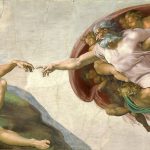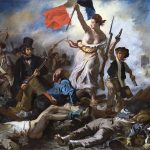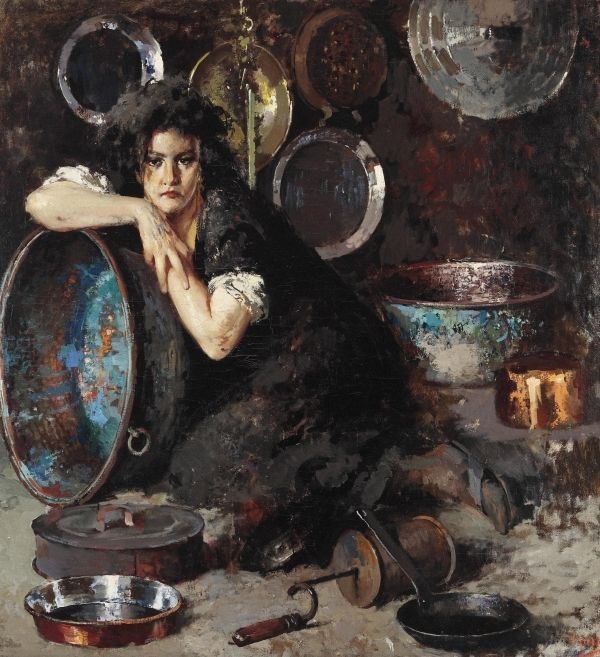
Vincenzo Irolli was one of Italy’s most expressive and passionate painters, known for his vivid use of color and emotionally charged compositions. Born in Naples in 1860, he developed a unique style that blended Impressionist influences with traditional Neapolitan artistry. His paintings often depicted everyday life, with a special focus on themes of motherhood, love, and religious devotion. Over time, his distinctive brushwork and luminous palette earned him recognition across Europe, making him a celebrated yet sometimes overlooked master of his era.
Despite achieving success, Irolli’s career was not without challenges, as the shifting art world of the early 20th century moved toward modernist trends. His preference for rich, expressive realism sometimes put him at odds with the emerging avant-garde movements that prioritized abstraction. Nevertheless, his works remained deeply evocative, capturing the warmth and spirit of southern Italy in ways few could rival. Today, collectors and art historians have begun to reassess his contributions, acknowledging the depth and beauty of his artistic legacy. His paintings, once fashionable among European aristocrats, continue to captivate audiences with their radiant energy and emotional intensity.
This article explores Vincenzo Irolli’s life, artistic influences, major works, relationships, and legacy. From his early days as a student in Naples to his international acclaim and later struggles, we will delve into what made his art so unique. By understanding his stylistic choices, the people who shaped his career, and the challenges he faced, we gain insight into why his paintings continue to resonate. Whether you are an art enthusiast, a collector, or simply curious about Italian painters, Irolli’s story is one worth knowing.
Early Life and Education
Vincenzo Irolli was born on September 30, 1860, in Naples, Italy, a city renowned for its deep artistic traditions and cultural vibrancy. Growing up in this lively environment, he was exposed to the dramatic use of light and shadow that defined Neapolitan painting. His family recognized his artistic potential early on and encouraged him to pursue formal training. This support allowed him to refine his skills and gain a solid foundation in the techniques that would later define his signature style.
He enrolled at the Naples Academy of Fine Arts, one of Italy’s most prestigious institutions, where he studied under renowned masters. Here, he was influenced by the works of Domenico Morelli and Filippo Palizzi, both of whom were central figures in Italian Realism. Morelli’s dramatic compositions and Palizzi’s attention to naturalistic details had a lasting impact on Irolli’s artistic development. During this time, he also became familiar with the Macchiaioli movement, which emphasized strong contrasts of light and color—elements that would later become central to his own style.
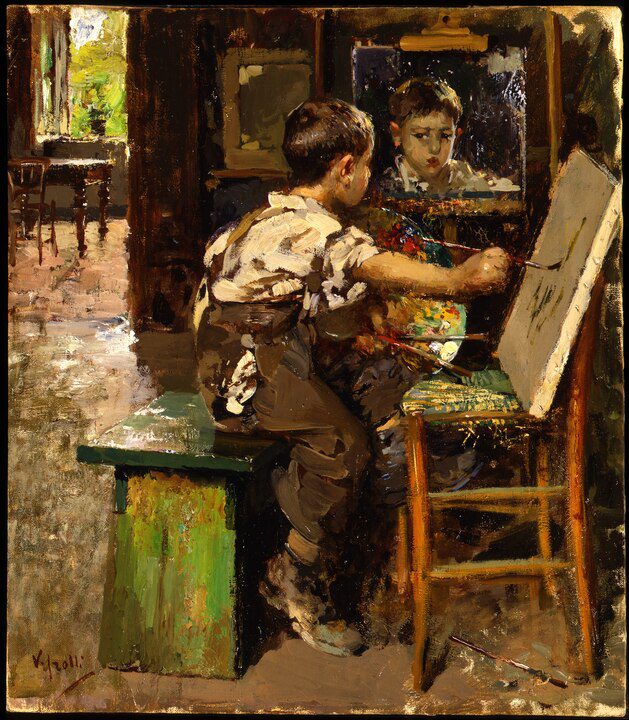
As a student, Irolli excelled in capturing human emotion and atmospheric depth, setting himself apart from many of his contemporaries. His early works displayed a remarkable ability to portray warmth, intimacy, and realism, even in seemingly simple compositions. This talent caught the attention of both professors and art critics, leading to his first public exhibitions. By the time he completed his formal education, he was already establishing himself as a promising artist with a distinctive and expressive touch.
His training at the academy laid the groundwork for a career that would see him gain recognition in Italy and beyond. However, while he remained deeply rooted in Neapolitan artistic traditions, he also embraced newer techniques that gave his paintings a fresh and modern quality. His ability to combine the discipline of academic realism with the vibrancy of impressionistic brushwork set him apart. This unique blend of styles would become a defining characteristic of his oeuvre, making his work instantly recognizable.
Artistic Style and Influences
Vincenzo Irolli’s style was deeply rooted in the traditions of the Neapolitan school while also reflecting the broader European artistic movements of his time. His use of color was particularly striking, with warm tones that brought a glowing intensity to his canvases. He mastered the technique of loose, fluid brushstrokes, which gave his paintings a sense of movement and spontaneity. This approach allowed him to capture fleeting expressions and delicate shifts in light with extraordinary skill.
One of Irolli’s greatest influences was the dramatic realism of Neapolitan Baroque painting, particularly the works of Caravaggio and Luca Giordano. He borrowed from their use of chiaroscuro—the sharp contrast between light and dark—to create depth and dimension. However, unlike the somber tones often seen in Baroque art, his work was infused with a luminous, joyful palette. This vibrant color scheme brought an emotional warmth to his subjects, making them feel more immediate and intimate.
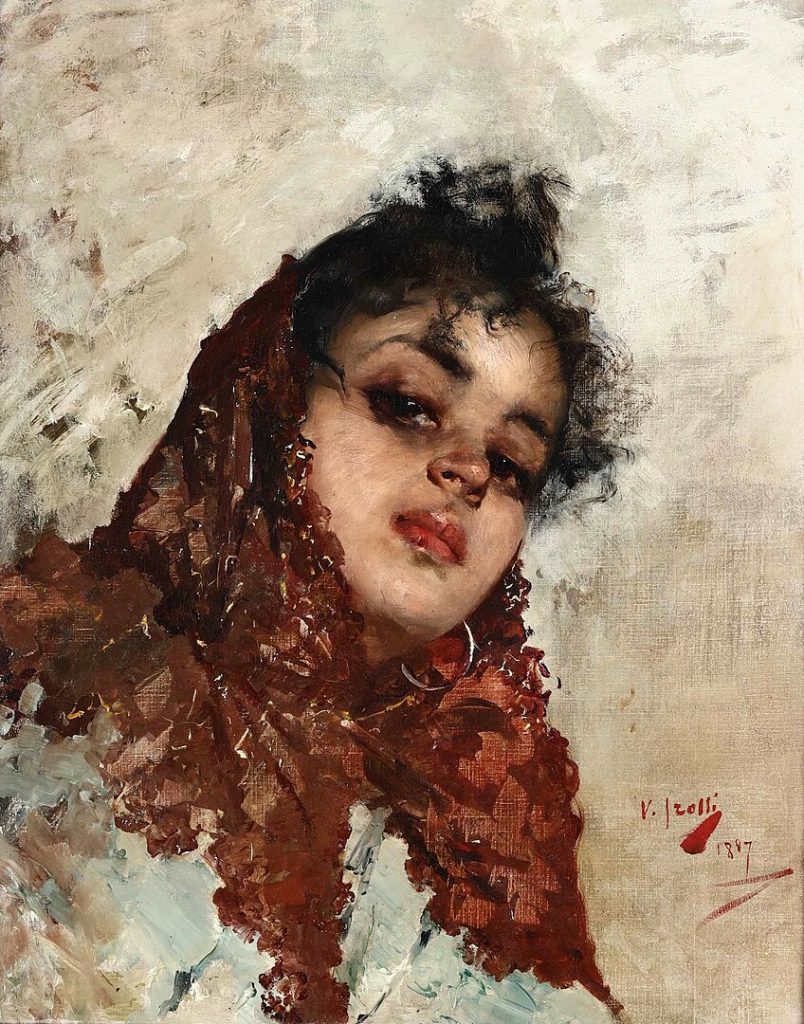
He was also influenced by the French Impressionists, particularly in his treatment of light and texture. While he did not fully adopt the Impressionist approach of breaking down forms into pure color and light, he incorporated some of their techniques into his own work. The Macchiaioli, an Italian art movement similar to Impressionism, also had a significant impact on his style. Like them, he used patches of color (macchie) to create atmosphere, giving his compositions a radiant and almost dreamlike quality.
Despite these influences, Irolli remained distinctly Neapolitan in his choice of subject matter and emotional depth. His paintings often depicted domestic life, children at play, mothers caring for their infants, and bustling Italian streets. These themes reflected his deep connection to Naples and its people, celebrating everyday moments with remarkable tenderness. This blend of international techniques with local sensibilities made his work both distinctive and widely appealing.
Career and Major Works
Irolli’s career began to flourish in the late 19th century, as his paintings gained attention in both Italy and abroad. His ability to capture emotion with rich, expressive brushwork quickly made him a favorite among collectors. He participated in numerous exhibitions, showcasing his works in major cities like Paris, London, and Munich. His international exposure helped solidify his reputation, earning him critical acclaim from European art circles.
Among his most notable works is La Bimba Malata (The Sick Child), a poignant depiction of a mother caring for her ailing daughter. This painting exemplifies his ability to convey deep emotion through light, color, and composition. Another important piece, Amore Materno (Maternal Love), highlights his recurring theme of motherhood, presenting a tender and intimate moment between a mother and child. His portraiture was also highly regarded, capturing the spirit and personality of his sitters with remarkable sensitivity.
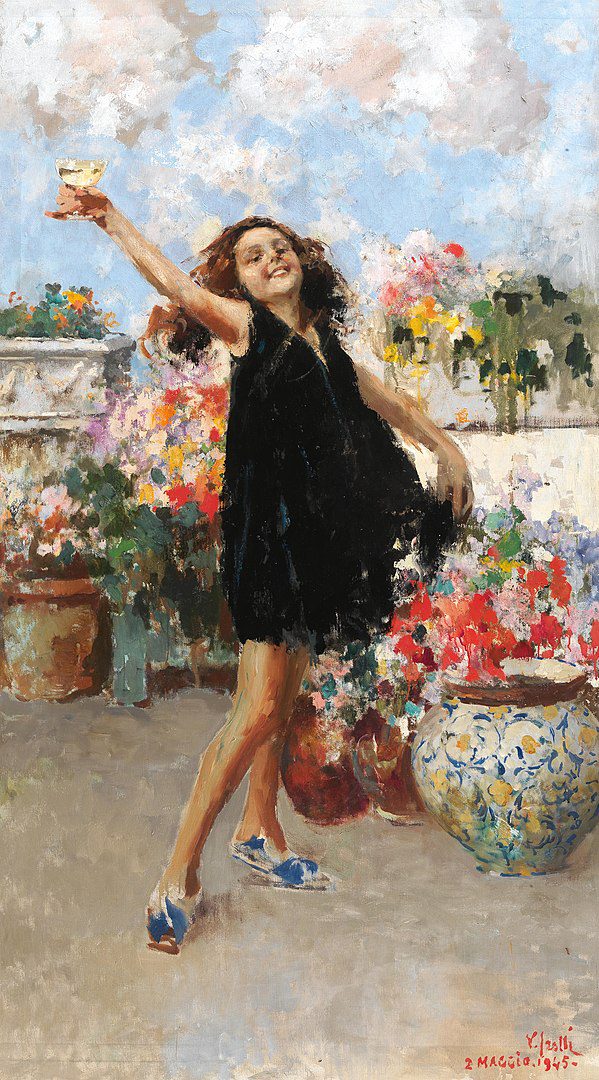
His paintings were highly sought after by aristocrats and collectors, who admired his ability to merge technical mastery with heartfelt emotion. La Contadina (The Peasant Woman) is another significant work that showcases his fascination with rural life and simple beauty. Through warm tones and delicate brushstrokes, he transformed seemingly mundane subjects into luminous, evocative scenes. These paintings not only demonstrated his technical prowess but also revealed his deep appreciation for everyday life and its quiet moments of joy.
Throughout his career, Irolli remained dedicated to his artistic vision, even as trends shifted around him. He never fully embraced abstraction or modernist techniques, choosing instead to refine and perfect his own style. This unwavering commitment to his craft allowed him to maintain a dedicated following, even as his work became less fashionable in later years. His major works continue to be celebrated for their masterful execution and emotional depth, securing his place as one of Italy’s most distinctive painters.
Relationships, Collaborations, and Patrons
Throughout his career, Vincenzo Irolli formed valuable relationships with fellow artists, collectors, and patrons who played a crucial role in his success. He was deeply connected to the Neapolitan art scene and maintained friendships with painters who shared his admiration for expressive realism. Among his contemporaries, he was often compared to Antonio Mancini and Francesco Paolo Michetti, both of whom also embraced vibrant color and emotive compositions. These connections helped him establish a reputation beyond Naples, drawing the attention of collectors and critics across Italy.
Irolli’s work attracted wealthy patrons who admired his ability to capture the warmth and vitality of everyday life. His paintings, often depicting tender moments between mothers and children, appealed to European aristocrats who sought intimate, sentimental artwork for their collections. The patronage of influential art buyers allowed him to exhibit in international venues, further expanding his reach. Despite his growing success, he remained dedicated to his personal artistic vision, never compromising his style to fit changing trends.
He also maintained relationships with prominent art critics, some of whom praised his ability to balance technical skill with emotional depth. His work was frequently reviewed in Italian and French art journals, where critics acknowledged his unique blend of realism and impressionistic influences. This critical recognition helped solidify his reputation, ensuring that his paintings were featured in high-profile exhibitions. However, as modernist movements gained momentum, some critics began to view his style as outdated, challenging his ability to maintain relevance.
In addition to aristocratic patrons and critics, Irolli’s work was collected by European museums, adding to his prestige. Institutions in Italy and abroad acquired his paintings, recognizing their historical and artistic value. His ability to depict the beauty of everyday life with such vibrancy ensured that his works remained in demand, even as artistic trends shifted. These relationships—whether with fellow artists, patrons, or critics—were instrumental in shaping his career and securing his legacy in the world of Italian art.
Challenges and Late Career
As the 20th century progressed, Vincenzo Irolli found himself facing new artistic challenges that threatened his standing in the art world. The emergence of modernist movements such as Cubism and Futurism shifted artistic tastes away from the expressive realism that had defined his work. While he continued to paint with the same passion and dedication, his style was increasingly seen as traditional in a world that was embracing abstraction and avant-garde experimentation. This shift led to a decline in critical recognition, making it harder for him to secure prominent exhibitions.
Despite these challenges, Irolli remained committed to his artistic principles, refusing to conform to the changing demands of the art market. He continued to produce deeply emotive paintings, maintaining his signature use of light and color. His later works, while still masterfully executed, struggled to attract the same level of enthusiasm as his earlier pieces. Collectors who once sought his work began turning their attention to more experimental artists, further diminishing his commercial success.
As his popularity declined, Irolli faced financial difficulties that forced him to rely more heavily on private commissions. Wealthy patrons who had long admired his work continued to support him, but this was not enough to restore the widespread recognition he had once enjoyed. His exhibitions became less frequent, and the art world’s focus moved further away from the themes that had defined his career. Nevertheless, he remained artistically active, painting with the same passion that had guided him since his early years.
By the time of his death in 1949, Irolli had largely faded from the public eye, overshadowed by the dominance of modernist and abstract movements. However, his paintings continued to hold sentimental value for those who appreciated his masterful technique and deeply human subjects. While he may not have achieved the enduring fame of some of his contemporaries, his legacy endured through the collectors, museums, and admirers who recognized the beauty and significance of his work.
Legacy and Influence on Italian Art
In the decades following his death, Vincenzo Irolli’s work underwent a gradual reassessment as art historians and collectors began to reappreciate his contributions. While modernist and avant-garde movements had once overshadowed him, a renewed interest in 19th and early 20th-century realism brought his paintings back into the spotlight. Today, his work is celebrated for its masterful use of color, light, and emotional depth, securing his place in the history of Italian art.
Irolli’s influence can be seen in the work of later Italian painters who sought to capture the same warmth and vitality in their subjects. His ability to blend realism with impressionistic techniques inspired future generations who admired his expressive brushwork and luminous compositions. While he may not have been at the forefront of any particular artistic movement, his paintings continue to resonate with those who appreciate traditional craftsmanship combined with emotional intensity. His distinct approach to portraiture and genre painting remains a benchmark for artists seeking to capture the beauty of everyday life.
Today, his works are housed in prestigious museums and private collections, with auction prices reflecting a growing appreciation for his artistry. Exhibitions dedicated to his work have drawn renewed attention, allowing new audiences to discover his luminous and emotive paintings. Scholars have revisited his contributions, emphasizing the importance of his role in preserving and extending the Neapolitan artistic tradition. This recognition has ensured that his name remains an important one in discussions of Italian art from the late 19th and early 20th centuries.
While he may not have been a radical innovator, Irolli’s commitment to capturing human emotion and everyday beauty continues to captivate audiences. His ability to convey tenderness, warmth, and light has secured his legacy as one of Italy’s most beloved and enduring artists. As more art enthusiasts rediscover his work, his reputation continues to grow, proving that his vibrant, expressive paintings still have the power to move and inspire.
Conclusion
Vincenzo Irolli’s career was marked by both success and challenges, but his dedication to his artistic vision never wavered. His ability to merge traditional Neapolitan realism with impressionistic techniques allowed him to create paintings full of warmth and emotional depth. Despite facing a decline in recognition during the rise of modernism, his work has since been rediscovered and celebrated for its technical mastery and vibrant expression. Today, he is regarded as one of the finest Italian painters of his time, admired for his ability to capture the beauty and emotion of everyday life.
His paintings continue to be sought after by collectors and institutions, further cementing his status in art history. Through his evocative use of color, light, and composition, he created images that remain as compelling today as they were in his lifetime. His ability to portray tenderness, love, and quiet moments of reflection ensures that his art will never fade into obscurity. In an era where traditional artistic values are once again being appreciated, Irolli’s work stands as a testament to the enduring power of beauty and emotion in painting.
For those who appreciate classical painting with a touch of impressionistic brilliance, Vincenzo Irolli’s work offers a timeless source of inspiration. His paintings serve as a reminder of the rich artistic heritage of Naples and the lasting impact of a painter who remained true to his vision. As his legacy continues to grow, his luminous and expressive paintings will undoubtedly captivate future generations of art lovers. In the ever-changing landscape of art history, Irolli’s contribution remains a cherished and important chapter.
Key Takeaways
- Vincenzo Irolli was a Neapolitan painter known for his luminous colors and expressive brushwork.
- He blended traditional realism with impressionistic techniques, creating emotionally rich compositions.
- His career flourished in the late 19th and early 20th centuries, but he faced challenges as modernism gained popularity.
- His work has been rediscovered in recent decades, leading to renewed appreciation among collectors and historians.
- His legacy endures as one of Italy’s most expressive and emotive painters, celebrated for his depiction of everyday life.
Frequently Asked Questions (FAQs)
1. What style of painting did Vincenzo Irolli use?
Irolli combined elements of Neapolitan realism and Impressionism, using loose brushwork and luminous color.
2. What were Vincenzo Irolli’s most famous paintings?
Some of his best-known works include La Bimba Malata, Amore Materno, and La Contadina.
3. Why did Irolli’s popularity decline in the 20th century?
His traditional style was overshadowed by modernist movements like Cubism and Futurism.
4. Where can I see Vincenzo Irolli’s paintings today?
His works are housed in museums and private collections across Europe, with some appearing in auctions.
5. What makes Vincenzo Irolli’s art unique?
His ability to capture warmth, light, and emotion with expressive brushstrokes and vibrant color makes his work distinctive.

